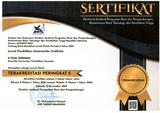PENGARUH MODEL PEMBELAJARAN PROBLEM BASED LEARNING BERBANTUAN PoWs TERHADAP KEMAMPUAN PEMECAHAN MASALAH MATEMATIKA SISWA KELAS VII SMP NEGERI 4 SINGARAJA
DOI:
https://doi.org/10.23887/jjpm.v3i1.6309Abstract
Penelitian ini bertujuan untuk mengetahui apakah kemampuan pemecahan masalah matematika siswa yang dibelajarkan dengan model pembelajaran Problem Based Learning berbantuan PoWs lebih tinggi dibandingkan dengan kemampuan pemecahan masalah siswa yang dibelajarkan dengan pembelajaran konvensional. Jenis penelitian ini adalah ekperimen semu dengan desain penelitian yang digunakan adalah post-test only control group design. Adapun populasi penelitian ini adalah seluruh siswa Kelas VII non unggulan SMP Negeri 4 Singaraja tahun ajaran 2014/2015. Pengambilan sampel ditentukan dengan teknik random sampling. Data kemampuan pemecahan masalah matematika siswa diperoleh melalui tes kemampuan pemecahan masalah yang diberikan di akhir penelitian. Data yang diperoleh dianalisis menggunakan Uji-t satu ekor(ekor kanan) dengan taraf signfikansi 5% dan dk 77. Hasil post-test menunjukkan bahwa rata-rata skor kemampuan pemecahan masalah matematika siswa yang dibelajarkan dengan model pembelajaran Problem Based Learning berbantuan PoWs adalah 93,42 sedangkan rata-rata skor kemampuan pemecahan masalah matematika siswa yang dibelajarkan dengan pembelajaran konvensional adalah 87,92. Dari hasil analisis data, diperoleh thitung = 4,0691 dan ttabel = 1,9912. Jika dibandingkan thitung > ttabel sehingga H0 ditolak. Oleh karena itu, dapat disimpulkan bahwa kemampuan pemecahan masalah matematika siswa yang dibelajarkan menggunakan model pembelajaran Problem Based Learning berbantuan PoWs lebih tinggi dibandingkan dengan kemampuan pemecahan masalah siswa yang dibelajarkan dengan pembelajaran konvensional.Kata Kunci : Problem Based Learning, PoWs, Kemampuan Pemecahan Masalah Matematika.
This research aims to determine whether students abilities in mathematical problem solving that learned with Problem Based Learning model aided by PoWs is higher than the problem solving ability of students that learned with conventional learning. The research is a quasi-experimental, with the design of the research is the post-test only control group design. The research population was all regular students of Class VII in SMP Negeri 4 Singaraja in the academic year 2014/2015. Sampling was determined by random sampling technique. Data of students ability in mathematical problem solving is obtained through the test of problem-solving that given at the end of the study. Data were analyzed using one-tailed t-test (right tail) with level of signficance 5% and df 77. Post-test results indicate that the average score of students ability in mathematical problem solving that learned with Problem Based Learning aided by PoWs is 93.42 while the average score of students ability in mathematical problem solving that learned with conventional learning is 87.92. From the data analysis, obtained tobservation = 4,0691 and ttable = 1,9912. It turns out tobservation > ttable so that H0 was rejected. Therefore, it can be concluded that the students ability in mathematical problem solving that learned using Problem Based Learning aided by PoWs higher than the students ability in problem solving that learned with conventional learning.
keyword : Problem Based Learning, PoWs, Problem Solving Ability
Published
2015-11-25
Issue
Section
Articles
License

Jurnal Pendidikan Matematika Undiksha is licensed under a Creative Commons Attribution-ShareAlike 4.0 International License.





